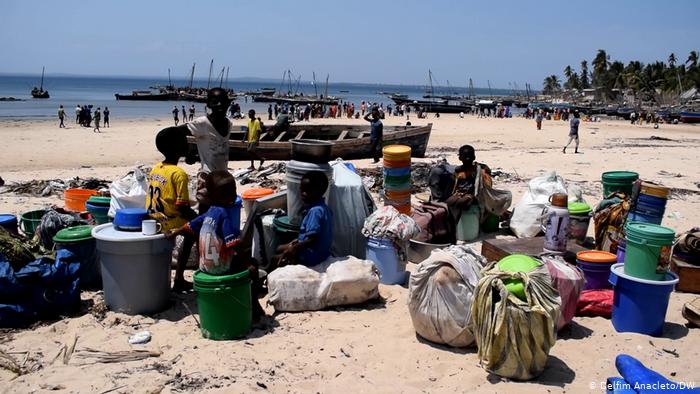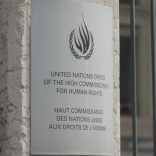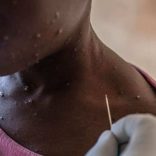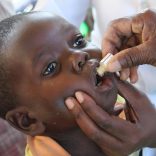Mozambique must improve climate change response
Cabo Delgado: “Some give birth on boats”

Photo: DW
Since Friday (16.10), more than one thousand displaced people (IDPs) have arrived in Pemba by boat, including children, pregnant women and sick people in need of care. Authorities meanwhile confirm an increase in the number of attacks in Cabo Delgado.
Armindo Ngunga, Secretary of State in the province of Cabo Delgado, acknowledged in a conversation with journalists this Tuesday (20.10) that there has been an intensification of terrorist attacks in recent months.
“It seemed to be an action which could eventually be overcome in a short time. That is why we, at that time, called these guys evildoers. [They] have been growing in terms of performance, which worries us. Especially the refinement with which they carry out their barbarities,” Ngunga explained.
The Secretary of State added that, since March this year, “the matter has got worse, because they started to attack not only administrative posts and villages, but also some district capitals in the central and northern regions of the province”.
The Defence and Security Forces (FDS) in the region have intensified operations in order to restore peace. However, according to the State’s representative in the province, this has not prevented people from moving to areas considered safer, such as districts in the south of the province.
This Monday (19.10), 21 vessels arrived in Pemba carrying more than a thousand people.
New wave of IDPs
“Because of the upsurge in terrorist actions on the coast of Quissanga and Macomia districts, and probably also in Mocímboa da Praia, we have been witnessing the movement of people to the city of Pemba.”
The number of IDPs has increased since last Friday (16.10), when more than 15 overcrowded vessels landed at Paquitequete beach in Pemba, bringing hundreds of people, including children, pregnant and sick women.
The number of displaced people grew further in the following days. This Monday (19.10), a further 21 vessels, carrying more than a thousand people, landed.
One of the IDPs, who spoke on condition of anonymity, said he left Mucojo, Macomia district, about a week ago. He is now in Pemba with his wife and four children, and with nothing to eat.
“Here, in Pemba, I have nowhere to live. We are suffering a lot because we have no food. We have not eaten anything since last week. I am suffering, along with my children,” he said.
Births on boats
At least two pregnant women gave birth on boats during the flight to Pemba.
“Some pregnant women give birth on boats and arrived here with their babies. They have nothing to even wrap the baby, since they fled the war and went out with only a capulana around their bodies, so they often carry the babies in plastic basins,” the midwife who received and provided the first care to one of new mothers at the Paquitequete Health Centre said.
“Some babies arrive healthy, but the day before yesterday we had a case of a lady who gave birth to a stillborn in the boat. They brought her here and we didn’t know where to send the family. People of good will came and took the body and went to perform the burial,” she related.
In order to provide first aid to the displaced, many of them in a weak condition, the authorities announced that they had deployed a medical team to the landing site. The city of Pemba is the main entry point for these families, currently hosting more than 90,000 IDPs.
Relocation of displaced persons
Pursuant to their strategy for managing the displaced, the government has been allocating some families to other Cabo Delgado districts, such as Ancuabe, Metuge, Montepuez and Chiure.
The Secretary of State for Cabo Delgado says that the government is heavily involved in caring for the displaced, “looking for land in the districts, so that people are not left without shelter, including the sick, as has been the case”.
“We want people to rebuild their lives and also do some agricultural production, so that soon they will no longer be dependent on donations,” he says.
It is estimated that violence in central and northern Cabo Delgado has already caused more than 250,000 IDPs to relocate to areas considered more secure.












Leave a Reply
Be the First to Comment!
You must be logged in to post a comment.
You must be logged in to post a comment.